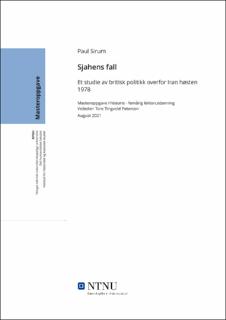| dc.contributor.advisor | Petersen, Tore Tingvold. | |
| dc.contributor.author | Sirum, Paul. | |
| dc.date.accessioned | 2021-09-16T16:00:15Z | |
| dc.date.available | 2021-09-16T16:00:15Z | |
| dc.date.issued | 2021 | |
| dc.identifier | no.ntnu:inspera:80290154:27596200 | |
| dc.identifier.uri | https://hdl.handle.net/11250/2778699 | |
| dc.description.abstract | Dette studiet er en analyse av britisk utenrikspolitikk overfor Iran under høsten 1978. Studiet redegjør for historiske britiske interesser i Iran, angloiranske relasjoner fram til den iranske revolusjonen, og det kompliserte forholdet mellom Storbritannia og den iranske monarken, Sjah Reza Pahlavi. I løpet av høsten 1978 forlot Storbritannia sin iranske allierte, som de for 25 år siden aktivt hadde satt på tronen, til fordel for å beskytte egne interesser i Iran. Sjahen hadde møtt en stadig sterkere motstand fra forskjellige grupper i det iranske samfunnet, og mot slutten av 1978 var det verken politisk handlingsrom eller politisk vilje hos britene for å redde den utsatte monarken. Storbritannias politiske muligheter hadde blitt begrenset som et resultat av tidligere politikk, som hovedsakelig var preget av kommersiell utvikling i Iran og det konkrete målet om å ikke fornærme Sjahen. Ting ble enda vanskeligere under høsten da både revolusjonens store frontfigur, Ayatollah Khomeini, og generalsekretæren for Sovjetunionens kommunistiske parti, Leonid Brezhnev, advarte mot utenlandsk innblanding i Irans interne affærer. De nasjonale streikene i viktige næringer, deriblant oljefeltene, gjorde også at Sjahens tilstedeværelse ikke nødvendigvis ville gagne britiske interesser; så lenge han forble i Iran ville landets næringer lide. Det ble derfor bedømt som fordelaktig at han ble etterfulgt av et iransk nasjonalistisk regime, som i hvert fall ville ha en interesse i å opprettholde handelsavtaler og oljeforsyninger, i stedet for et kommunistisk regime som ville være fiendtlig mot Vesten og være i favør for Sovjetunionen. I kontrast med Carter-administrasjonen, som ble begrenset av en mangelfull politikk overfor Iran, og interne uenigheter, inntok Storbritannia en nøytral rolle; de støttet verken Sjahen eller hans opposisjon. I stedet satt Callaghans Labour-regjering på sidelinjen, drevet av deres ønske om å beskytte egne interesser i Iran, og lot regimet falle. | |
| dc.description.abstract | This study is an analysis of British foreign policy towards Iran during the autumn of 1978. The study documents historical British interests in Iran, Anglo-Iranian relations prior to the Iranian revolution, and the complicated relationship between the UK and the Iranian monarch, Shah Reza Pahlavi. During the autumn of 1978, the UK left their Iranian ally, whom they actively had placed on the throne 25 years ago, to protect their own interests in Iran. The Shah had been facing an increasing opposition from many different groups in the Iranian society, and towards the end of 1978 there was neither political feasibility nor political will to save the weakened monarch. The UKs political choices had been limited as a result of previous policy, which was mainly focused on commercial development in Iran and the concrete goal of not avoiding any offenses the Shah. This assessment was further complicated during autumn when the revolutions leading figure, Ayatollah Khomeini, and the General Secretary of the Soviet Union’s Communist Party, Leonid Brezhnev, publicly warned against any foreign interference in Iran’s internal affairs. The national strikes in important industries, notably the oilfields, in effect made the Shah’s presence no longer beneficial for British interests; as long as he remained in the Iran the industries would suffer. It was therefore deemed beneficial to have him replaced by an Iranian nationalist regime, which at least would have an interest in keeping up trade agreements and the supply of oil, rather than a communist regime which would be hostile towards the West and favorable to the Soviet Union. In contrast to the Carter-administration, which was hampered by a lacking policy towards Iran and internal disagreements, The UK played a neutral role; not actively supporting the Shah nor his opposition. Instead, Callaghans Labour-government awaited the outcome on the sidelines, driven by the wish to protect their own interests in Iran, and as a result let the regime fall. | |
| dc.language | nob | |
| dc.publisher | NTNU | |
| dc.title | Sjahens fall - Et studie av britisk politikk overfor Iran høsten1978 | |
| dc.type | Master thesis | |
